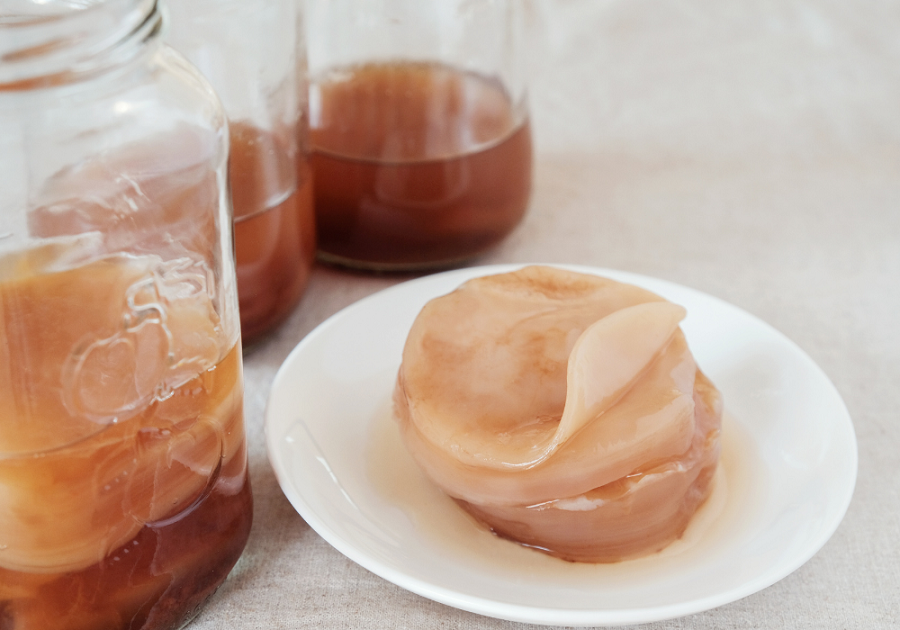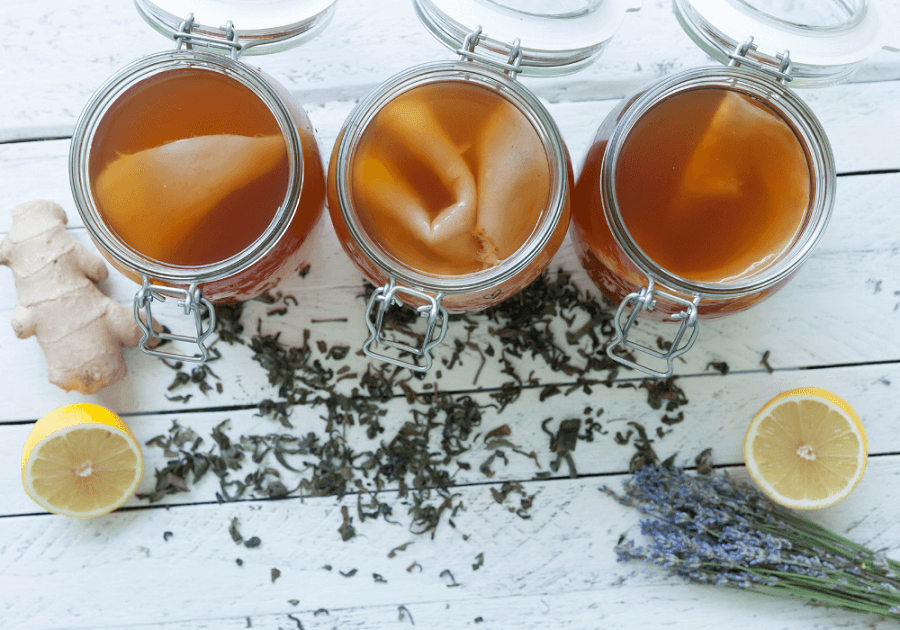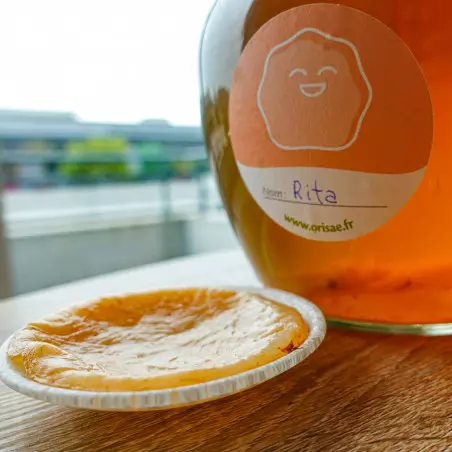The kombucha ,This drink of Asian origin is rich in probiotics, refreshing, and sparkling just like the kefir .. This beverage has taken the world by storm thanks to its health benefits and unique taste. However, many people are attracted to the pleasure of making their own kombucha at home, and to do this, it is essential to find a quality kombucha mother. But where can you buy this precious living culture ?
In this article, we explore the best places to buy a kombucha mother, allowing you to start making kombucha at home with confidence and enthusiasm.
How to obtain a kombucha starter ?
You have surely heard about the SCOBY (Symbiotic Culture of Bacteria and Yeast), which is none other than the kombucha culture (or symbiotic culture in French). In order to obtain this culture, which is the essential ingredient for preparing kombucha, you have several options:
- You can buy a kombucha mother directly online at Biovie ,this will save you time and you will have a biologically quality SCOBY ready to use as soon as the delivery person rings your doorbell.
- You can ask a friend who already makes kombucha if they have an extra SCOBY to give you, or look in online sharing or trading groups dedicated to kombucha. It is often an economical option, and it is an opportunity for you to expand your network with passionate kombucha enthusiasts. With their experience, they will give you advice to help you learn all the tips you need to know about this drink and its preparation.
- The last option you have left is to make your own SCOBY. Don't worry, it's quite easy to do. You will just need to invest a little time, some patience, and a bottle of unpasteurized and unfiltered kombucha. Simply pour the contents of the bottle into a clean container, cover it with a breathable cloth, and let it sit for a few weeks. Over time, a new kombucha culture will form on the surface.

Where to buy a kombucha mother ?
There are several places where you can buy a quality kombucha mother:
Online sale: As mentioned above, Biovie offers you a premium quality kombucha mother that you can purchase alone, or in complete organic kombucha pack if you prefer to have all the equipment and ingredients to make your kombucha at home.
Organic stores: You can find your happiness at stores specializing in fermented products or natural food shops. These are places that are often well-informed about the products they sell, and the vendors can provide you with additional advice for brewing kombucha.
Farmers' markets: Local farmers' markets can be an option for finding good quality kombucha mothers. Local producers can also sell live kombucha cultures as well as complete starter kits. Talk to them if you don't see any on the stalls! Buying from local producers not only allows you to get a good SCOBY but also supports the local economy.
Online sharing groups: These groups are one of the best alternatives for getting kombucha for free. Look for groups on social media or specialized forums about home brewing to find people willing to share their SCOBY with you.
How to use our Kombucha kit ?
Economically speaking, it is clear that buying a kit A kit containing all the necessary equipment to make your kombucha is much cheaper than buying all the equipment separately. The kit consists of:
- A 1-liter glass jar with a mechanical closure.
- A 1-liter glass bottle with a mechanical closure.
- A stainless steel strainer.
- An embroidered fabric to cover his kombucha.
- A 100g packet of organic black tea "Les Jardins de Gaïa" — grown in Rwanda, made in France.
- A flavoring of your choice (to be selected).
- Access to the complete guide for successfully making kombucha.
For the necessary ingredients and their respective quantities, you will need:
- 1 L of hot water (preferably spring water or filtered water)
- 5 g of black tea.
- 50 g of sugar.
- 50 g of SCOBY (provided).
Now, to use it, you can simply follow these steps:
- Make sure you have all the necessary items within reach.
- Make sure that your equipment is washed with very hot water or vinegar, your hands must be clean, and your utensils must be free of potentially harmful bacteria.
- We now begin with the first fermentation, F1, which primarily involves preparing the sweet tea by boiling water and letting the 5 grams of black tea steep for 10 minutes. Next, we will filter the tea leaves by transferring the tea into the fermentation container, add the sugar to the hot tea, and stir until completely dissolved. Let the tea cool to room temperature.
- Gently place the kombucha scoby (SCOBY) into the fermentation container, top side up. Make sure that the stump is completely submerged in the liquid.
- Place the embroidered cloth to cover your kombucha over the fermentation container. This allows air to circulate while preventing external contaminants from entering. Place the fermentation container in a location away from direct sunlight and let it ferment.
- After 5 days of fermentation, we get our kombucha. The harvest is done by removing the SCOBY with clean hands, straining the liquid through a sieve if you don't want too much yeast in your drink, and leaving about 10% in your container, which will be used to store your kombucha SCOBY.
- Pour your kombucha into a bottle. The drink will then be sweeter and less fizzy. If you want to have a less sweet and more fizzy kombucha, you should let it ferment a second time.
- For the second fermentation F2 (which is optional), it takes place without the SCOBY, leaving only the kombucha in the bottle. Add flavors if you wish and leave the bottle in a room at room temperature and away from light for 24 to 48 hours.
- Your kombucha is ready to be enjoyed! Serve it chilled and enjoy this delicious sparkling drink full of probiotics.
PS: The SCOBY will be preserved in the remaining 10% of kombucha and will be used for a new fermentation when preparing a new batch of the beverage.

What are the benefits of a fresh Kombucha mother ?
A fresh kombucha mother offers several important benefits:
- A fresh kombucha mother is essential for starting the fermentation of sweetened tea. This strain contains a large symbiotic community of acetic bacteria, yeasts, and beneficial microorganisms that transform sugar into organic acids and probiotic compounds. Without the kombucha mother, it would be almost impossible for you to start your fermentation.
- A fresh kombucha mother promotes the quality of your brewing and produces better kombucha than a dehydrated kombucha mother. It contains a variety of bacterial strains and yeasts that contribute to the complexity of flavors and the production of beneficial compounds.
- A fresh kombucha mother has a higher capacity to adapt to changes in the environment and variations in brewing conditions. She is more resistant to undesirable contaminations and can better adapt to fluctuations in temperature, pH, and other parameters.
It is important to know that there are different forms of SCOBY, each with its own particularity:
Fresh: The fresh kombucha mother is a living and active gelatinous disc that contains a symbiotic colony of beneficial bacteria and yeasts, which transforms sugar into organic acids, giving kombucha its characteristic taste. The fresh kombucha mother can be obtained from other kombucha brewers or by growing your own SCOBY from a batch of already prepared kombucha.
Dehydrated or dehydrated in powder form: These shapes are obtained by dehydrating fresh kombucha mother. They are generally sold in the form of dehydrated discs or powder, and must be rehydrated before use. However, it is important to note that dehydrated or powdered kombucha mother may be less active than the fresh version, as some of the beneficial bacteria and yeasts can be damaged or inactivated during the dehydration process.
Frozen: It is less common to find frozen kombucha mother, as freezing can also damage the living microorganisms present in the kombucha culture.
To encourage you to consume homemade kombucha, in addition to being rich in probiotics, it provides vitamins C and B (B1, B2, B3, B6, B9, and B12) and enzymes that help the body assimilate nutrients and strengthen the immune system. Furthermore, the colony of bacteria and yeast known as SCOBY, during fermentation, produces organic acids that are responsible for numerous benefits: acetic acid, gluconic acid, lactic acid, malic acid, oxalic acid, and usnic acid.








